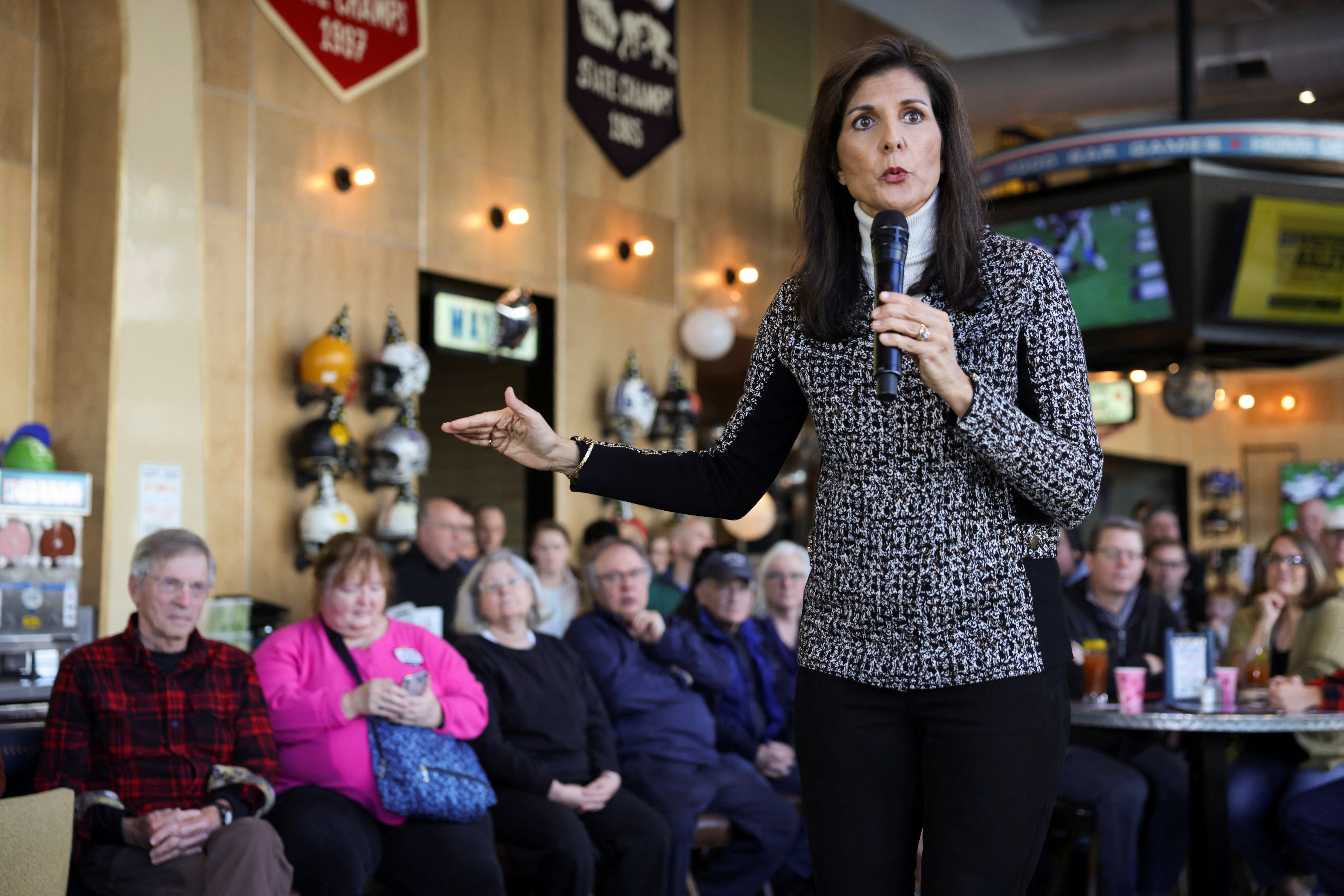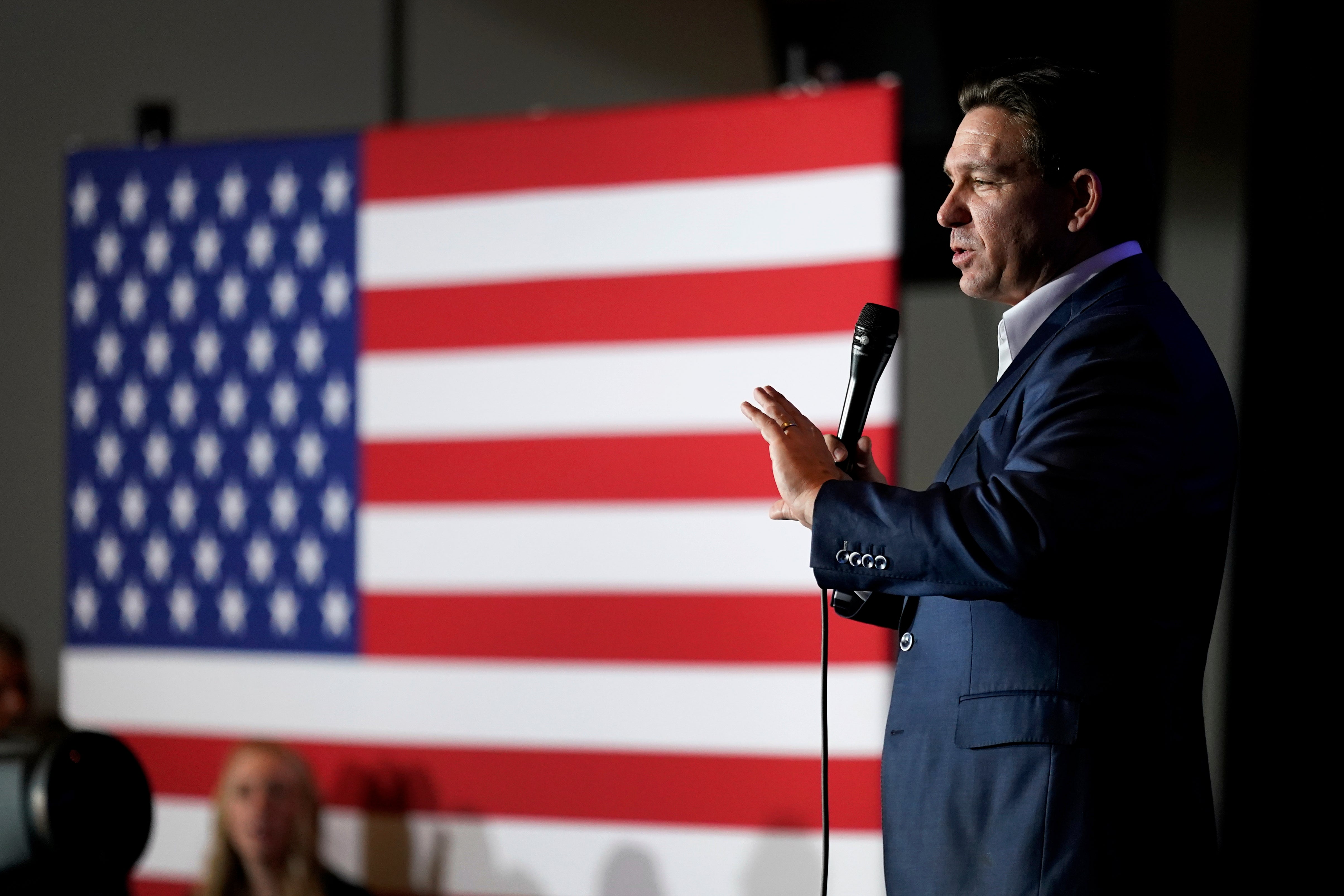The leading candidate for the Republican presidential nomination faces 91 criminal charges, nearly half of which are at the federal level. And yet his two main GOP rivals have said they would pardon him if they’re elected.
Quick Read
- Trump’s Legal Troubles: Donald Trump, the leading candidate for the Republican presidential nomination, faces a total of 91 criminal charges, with nearly half at the federal level. The charges include 40 federal counts related to classified documents at Mar-a-Lago and attempts to overturn the 2020 election results, 34 felonies in New York related to falsifying business records, and 13 charges in Georgia for leading a criminal enterprise to overturn the state’s election results.
- GOP Rivals’ Pardon Promises: Republican contenders Ron DeSantis and Nikki Haley have indicated they would pardon Trump if elected, citing the need to move on and prevent further division in the country. Both DeSantis and Haley have likened such a pardon to Gerald Ford’s pardon of Richard Nixon.
- Trump’s Potential Self-Pardon and DOJ Use: Trump, who could potentially be re-elected while facing trials, has suggested he might pardon himself and use the Department of Justice to drop federal cases against him. He has also promised pardons for individuals convicted in connection with the January 6 Capitol attack.
- State Charges and Pardon Limitations: State charges against Trump cannot be erased by a presidential pardon. The Georgia governor lacks pardon power, which is held by a state clemency board. New York charges are unlikely to lead to jail time.
- Severity of Federal Charges: The federal charges Trump faces are serious, with potential prison sentences of up to 20 years if convicted.
- Election Eligibility and Lawsuits: Trump faces lawsuits and allegations that threaten his eligibility to appear on ballots, alongside claims of fraud, sexual abuse, and defamation. His campaign has framed these legal challenges as a conspiracy to keep him from the presidency.
- GOP Response and Defense of Trump: Republican officials and Trump’s campaign rivals have largely defended him against the indictments, arguing that the investigations demonstrate a biased justice system. However, GOP rival Chris Christie has cautioned that pardoning Trump would suggest a dual system of justice in the U.S.
Reuters has the story:
Haley, DeSantis & Ramaswamy promise to pardon Trump if elected
Newslooks- Reuters
The leading candidate for the Republican presidential nomination faces 91 criminal charges, nearly half of which are at the federal level. And yet his two main GOP rivals have said they would pardon him if they’re elected.
Donald Trump faces 40 federal charges connected to his handling of classified documents at Mar-a-Lago estate, as well as another four federal charges stemming from his attempts to overturn the results of the 2020 election.

He faces another 34 felonies in New York, where he is accused of falsifying business records stemming from hush money payments to Stormy Daniels, and another 13 in Georgia, where he is accused of leading a criminal racketeering enterprise to overturn the state’s election results.
In recent days, Trump’s leading Republican challengers have vowed to pardon him if convicted on federal charges.
While campaigning in the days leading up to the first votes of 2024’s Republican primary elections, Ron DeSantis and Nikki Haley have both signalled they would grant clemency to the former president because it would be in the nation’s “interest” to do so.
“A leader needs to think about what’s in the best interest of the country,” Haley said in New Hampshire on Thursday. “What’s in the best interest of the country is not to have an 80-year-old man sitting in jail that continues to divide our country. What’s in the best interest of our country is to pardon him so that we can move on as a country and no longer talk about him.”
The next day in Iowa, DeSantis said: “We got to move on as a country”.
“Like Ford did to Nixon, because the divisions are just not in the country’s interest,” said the Florida governor, referencing Gerald Ford’s 1974 pardon of Richard Nixon.

Trump – who could be re-elected to the White House while in the middle of several criminal trials – could also, hypothetically, pardon himself, and use his US Department of Justice to drop the federal cases against him.
He also vowed mass pardons for the hundreds of people convicted in connection with the January 6 attack on the US Capitol, sparked by his ongoing false narrative that the 2020 election was stolen from him.
Convictions on state charges, however, can’t be erased by a president’s pardon, though Trump has signalled his intent to prosecute local elected district attorneys and prosecutors under his weaponised federal law enforcement.
Georgia’s governor does not have the power to grant a pardon, which rests with a state clemency board. Charges against Trump in New York are not likely to result in jail time.
The federal charges against him are among the most severe, with prison sentences, if convicted, of up to 20 years.

Trump also faces a growing list of lawsuits threatening his eligibility to appear on ballots altogether, as well as mounting allegations of fraud, sexual abuse and defamation, all of which the former president and his campaign allege is evidence of a conspiracy to keep him away from the presidency.
Those claims and developments in the criminal and civil cases against him have fuelled his campaign, which has amplified a conspiracy theory that President Joe Biden is directing the prosecutions against him as “election interference”.

Republican officials and Trump’s GOP rivals for the 2024 nomination have largely rushed to his defense after his indictments. Vivek Ramaswamy pledged to pardon Trump shortly after he was federally indicted in the Mar-a-Lago case.
Trump’s supporters have called the criminal investigations against him as evidence of a “two-tier system of justice,” while prosecutors and critics have repeatedly stressed that the nation’s laws apply equally – including against former presidents.
Pardoning him would merely prove that the US does have “two systems of justice,” GOP rival Chris Christie told supporters in New Hampshire last week. But not the kind that Mr Trump believes.
“One for all of us and one for the most powerful,” Christie said. “If we allow that to happen as a country, we would be no better – no better – than a lot of these tin-pot democracies around the world who treat the privileged different than they treat everyday citizens.”







